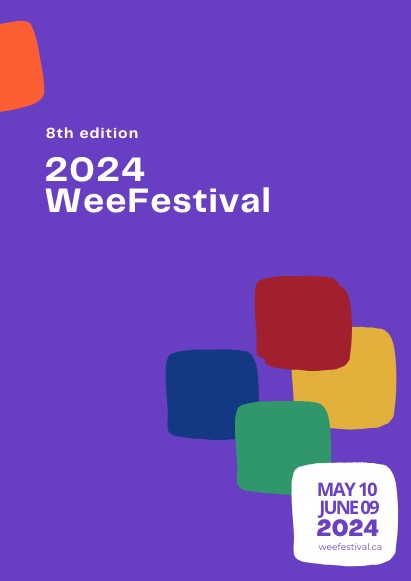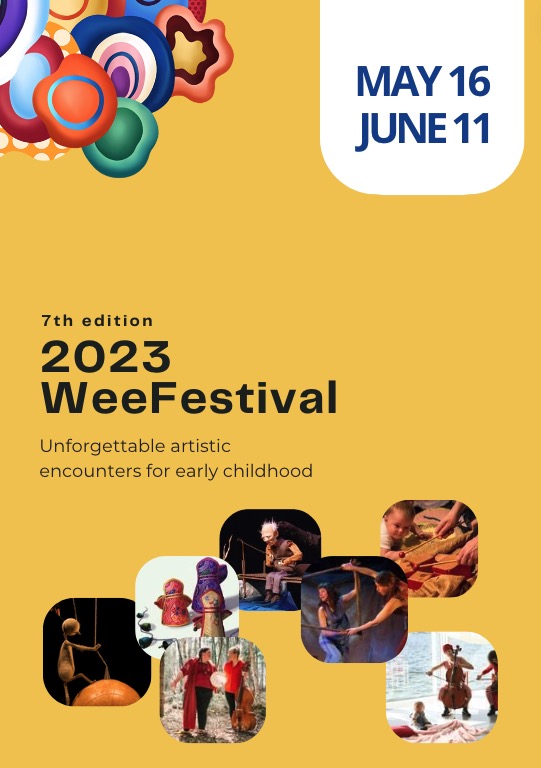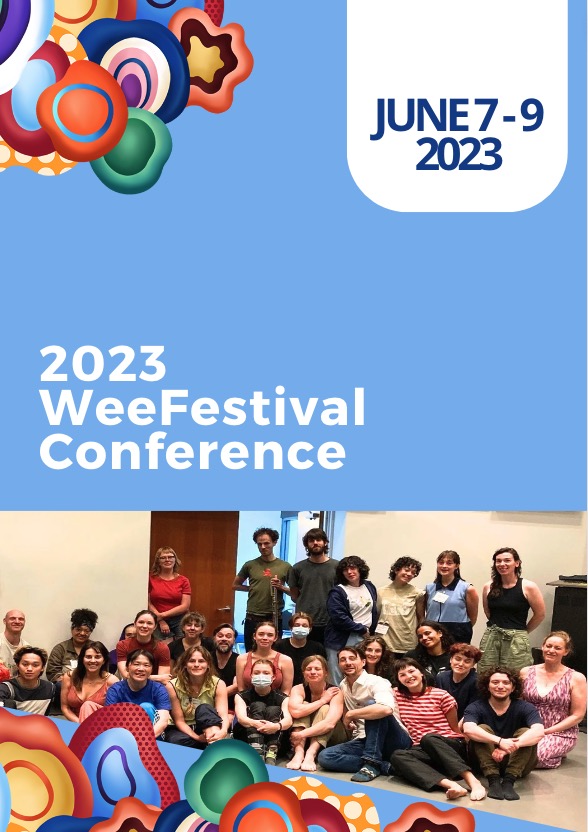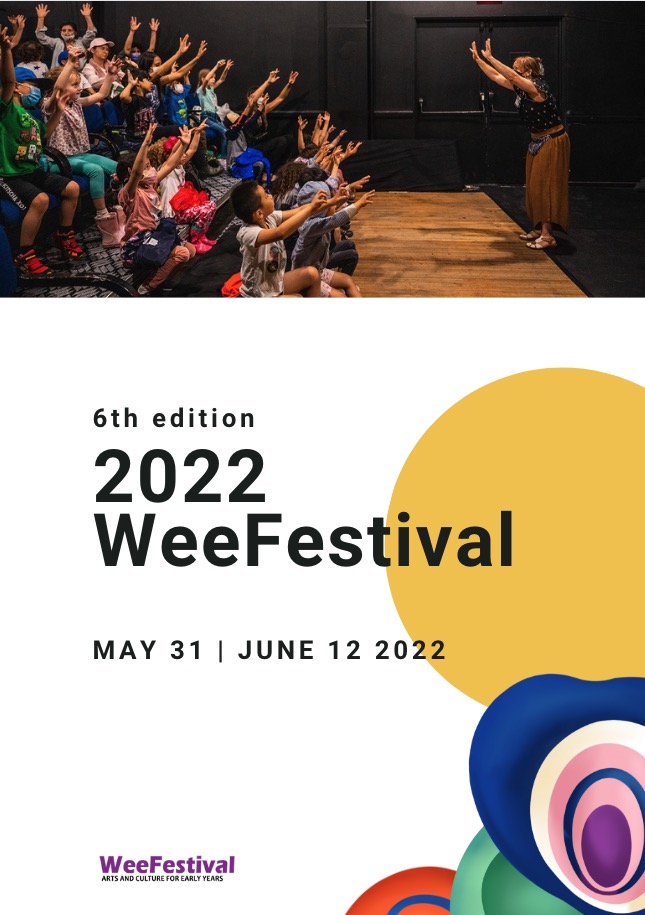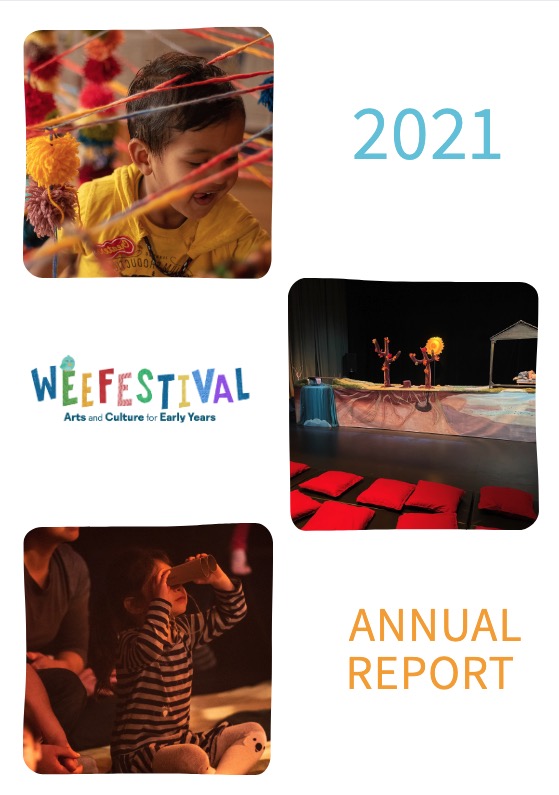What We Do:
WeeFestival is dedicated to the presentation of inspiring theatre and performing arts created especially for very young children and their families. Through our annual festival, we curate a dynamic and culturally diverse mix of productions from around the world and across the country from leading companies and artists specializing in art for early childhood.
Through its outreach programming in communities and schools, WeeFestival strives to increase access to quality theatre and performing arts experiences for children and families beyond Toronto. Through seed projects, commissions, residencies, and professional development workshops, WeeFestival hopes to contribute to the advancement of theatre for young audience practice with a growing, dynamic body of work created by Canadian artists.
History
WeeFestival was founded by Lynda Hill during her leadership of Theatre Direct Canada and as part of her exploration of theatre for very young. This included extensive research residencies in kindergartens and daycares, the creation of two new productions for children under 6 years and children with Developmental Disabilities, and the development of an early years curriculum in the company’s community drama programs.
Originally a biennial event, WeeFestival’s inaugural edition was in 2014. In 2019, after 3 successful editions, the festival shifted to an annual event and became a standalone organization under Lynda Hill’s direction. With the arrival of the pandemic, WeeFestival produced two digital festivals in 2020 and 2021, including an innovative week long festival called “A Play a Day” which reached thousands of Kindergarten to grade 2 students across the GTHA with quality filmed productions and multidisciplinary arts extensions. In 2022, WeeFestival returned with an in-person festival and digital programme.
Since its first edition, WeeFestival has presented over 65 productions from around the world and across the country, with 12 productions in digital form of 2020 & 2021. Festival commissions include Old Man and the River/le Vieil homme et la rivière, Flying Hearts, Table Top Tales, Tweet Tweet, Yassama and the Beaded Calabash/Yassama et la calabasse aux cauris, HauNodi by Diana Tso and Rubena Sinha , The Friendship Star by Cheri Maracle, Capoeira Criança, and Quest for the Moon, and Cooo by Xin Wang.
What We Believe:
We have a passionate belief in the right of every child, of all abilities, to experience and participate in arts and cultural experiences, as declared by the UN Convention of the Rights of the Child-Article 31, and that these rights are to be afforded to them from birth.
As the WeeFestival programming celebrates and promotes the importance of arts and creativity in early childhood, we therefore value the essential contribution and collaboration of artists, educators, and caring adults who enable children’s participation in arts and cultural activities.
We are driven by the conviction that regular exposure to the arts throughout these years has a positive and profound impact on the long-term health and well-being of a child, in strengthening child/caregiver bonds, and relationships with their peers thereby contributing to the realization of healthy and compassionate communities.
We believe our work will nurture in children a life-long love of the arts and that our present audiences are also future audiences and arts makers. Therefore, we passionately believe that increased investment in arts education and performing arts for young audiences is urgently needed to ensure the continued viability and sustainability of the larger performing arts sector.
Reports
Benefits of Arts in Early Childhood
- High quality arts or cultural experiences in early childhood can help children develop subsequent abilities in the arts which will be useful right through life.
- Early years arts and cultural activities can help children make sense of their cognitive, physical, emotional, spiritual, linguistic, and moral development by enhancing the whole curriculum.
- Early childhood arts and cultural activities can significantly strengthen and enrich children’s social bonds with their peers and parent-child bonds. These experiences further engage families and educators in their children’s learning, providing a positive focus for shared experience and communication.
- Stimulating and compelling experiences at museums, galleries, theatres, libraries, dance, arts or music venues will offer many parents the ideas, confidence and resources to play with their children as a natural part of everyday life.
- Early years arts and cultural activities can help develop intrinsic human qualities, such as creativity, expression, identity, culture and imagination. As well as helping to preserve our cultural heritage, they enable young children to develop their own languages which help shape their individual, community and global identity.
- Early years arts experiences can impact positively on confidence, self-esteem, personal, social, emotional development and behavioural health, breaking down language barriers, cultural prejudices or societal differences, and leading to decreased social problems, reduced inequality and increased creativity.
- Collaborations that encompass the perspective of arts or cultural professionals, early years professionals, children and parents can bring a vibrancy to learning that results in a much deeper understanding of, and attention to, a child’s needs and interests. This leads to sustainable progression, raising standards of achievement, and a sense of fulfillment for both teachers and children both immediately and later on in life.
About Theatre for Early Years
WeeFestival presents Theatre for Early Years for audiences 0 – 5/6 years. TEY often employs one or more of a wide range of disciplines including puppetry, object theatre, physical theatre, dance, installation performance, music theatre, and storytelling. TEY shares more in common with performance art and post-dramatic dramaturgies than it does with traditional theatre or TYA.
TEY Works are typically aimed at narrow age ranges taking into account the developmental stages of young children-infants, toddlers, preschoolers, and kindergarten age presented in intimate venues for small audiences in Relaxed Performance formats. The Relaxed Performance format also ensures inclusion for children with Developmental Disabilities and/or Autism.

